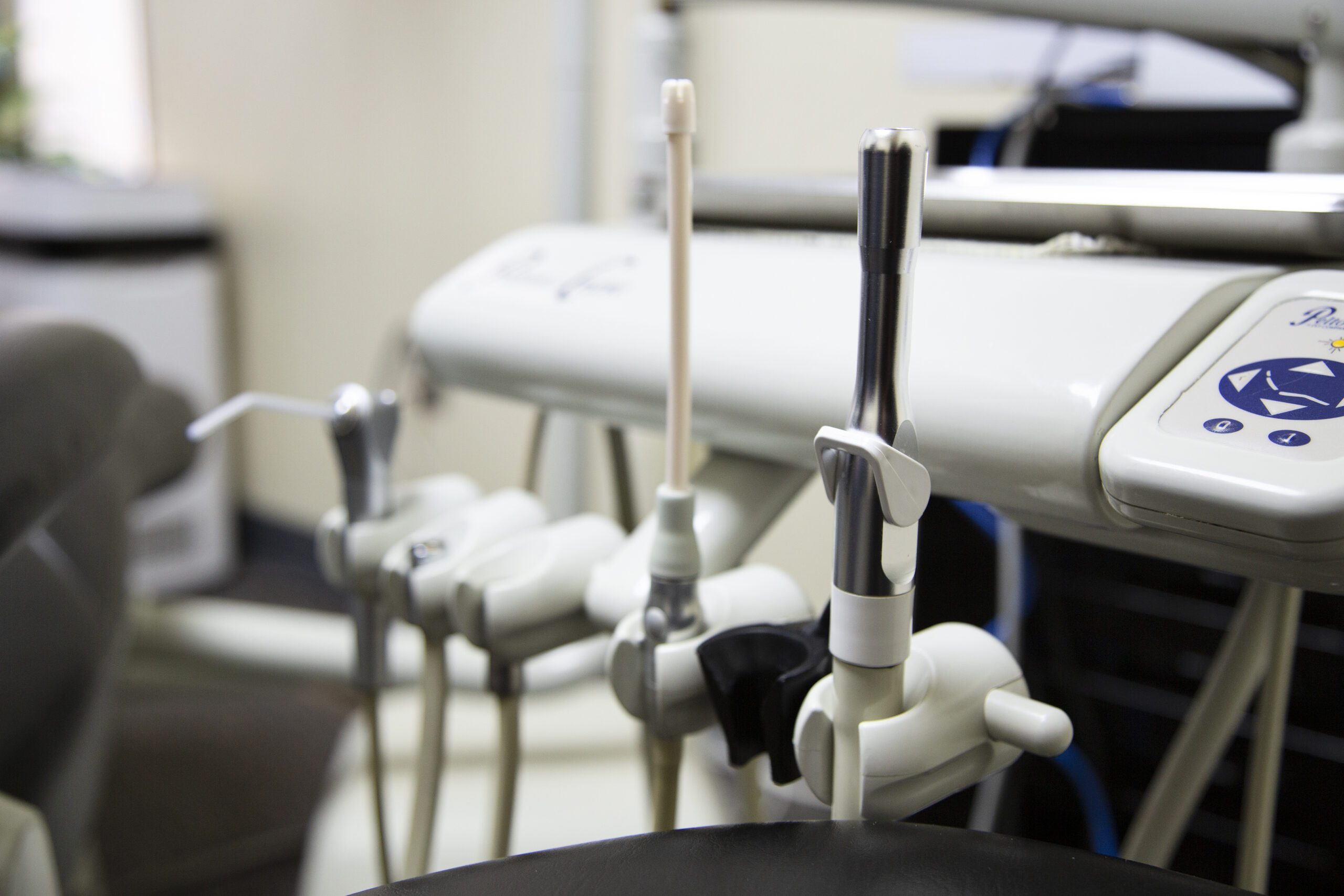Tonsil stones are a common issue that dentists see frequently. Often they can be unnoticed by the patient – primarily due to the positioning at the back of your throat. Unless you exhibit any noticeable symptoms, you probably won’t realize you have them until you go for a dental checkup.
The good news is that they don’t pose many oral health threats. Still, tonsil stones may be rather unpleasant.
Identifying tonsil stones is recommended, no matter what your treatment preference. By knowing that you have them, you can take action to remove them. In addition, removing the tonsil stones will stop them from growing bigger and causing more annoyance and symptoms.
If you wonder why tonsil stones are formed and ask yourself, “Where do tonsil stones come from,” we’ll explain everything you need to know about dealing with tonsil stones and how to treat tonsil stones.
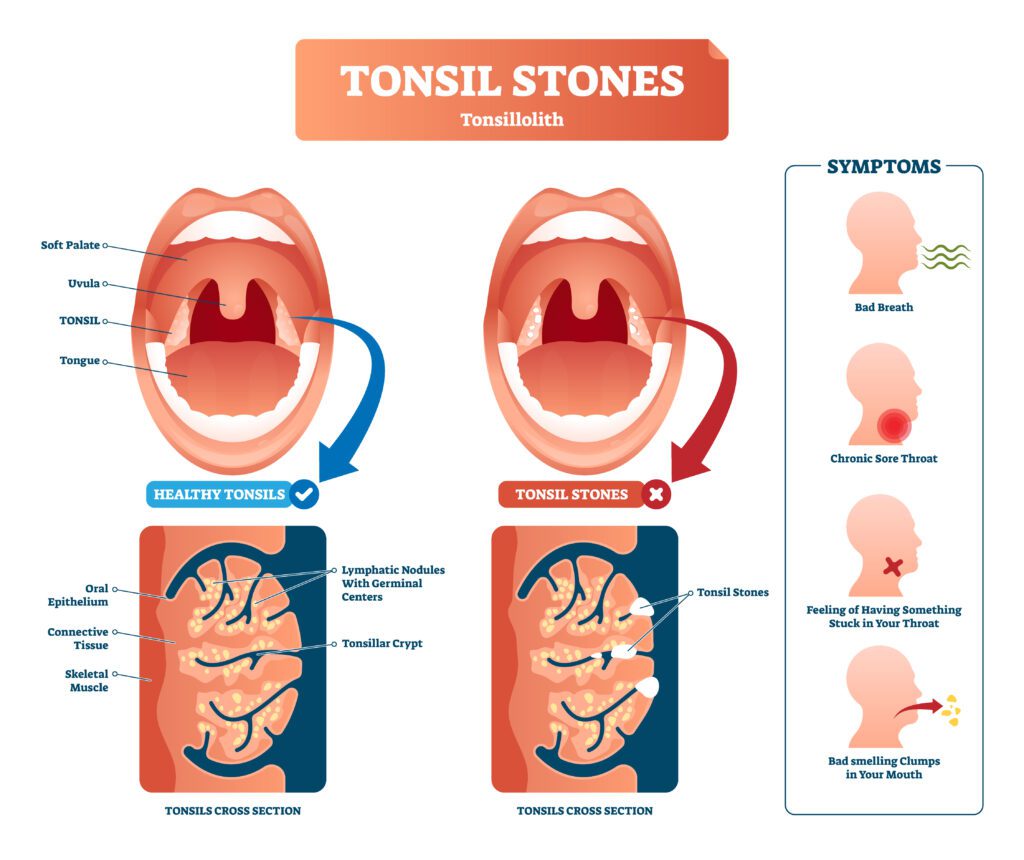
What are Tonsil Stones?
If you’re curious about what makes tonsil stones, let’s go over the basics.
Tonsil stones are often called tonsilloliths. According to Healthline media, they are deposits that form on or in your tonsils.
Typically tonsil stones form due to bacteria or debris attaching to the fleshy part of your tonsils on either side of your throat or recurrent tonsil infections. In most cases, these stones show small white or yellow spots. They will usually be as small as a speck of gravel, though they can grow much larger.
In their most miniature form, tonsil stones don’t cause problems with a person’s health and wellness. However, larger tonsil stones can cause your tonsils to swell, which may lead to further tonsil stone symptoms. In addition, people with tonsil stones often end up with ear pain and discomfort that may lead them to an ear, nose, and throat doctor.
If you wonder, “Are tonsil stones hard or soft?” the answer is both. As they form, tonsil stones will start as soft deposits. The longer they stay on your tonsils, the harder they get. The calcification is due to persistent bacterial infestation and the body’s immune system. White blood cells will invade the stone in an attempt to neutralize the bacteria. This is how a soft deposit becomes calcified.
As long as tonsilloliths remain in the back of the throat, tonsil stones may worsen until you remove them manually or they are medically reviewed with steps taken to dislodge them.
Luckily, you can see a doctor to have tonsil stones treated, or you may even be able to get away with tonsil stone removal without resorting to drastic surgical procedures. There are many home remedies to remove the stones, or you can visit a doctor to have your tonsil stones diagnosed and help you dislodge stones.

What Do the Signs and Symptoms of Tonsil Stones Include?
The easiest way to know if you have tonsil stones is to look for them.
Get in front of a mirror and shine a light into the back of your throat. Look at the sides of your mouth and the back of the throat to see if you spot any white or yellow spots. They can be tiny. Noticing irregular spots on the tonsils may indicate small tonsil stones forming.
Thankfully, this may be the only sign of tonsil stones you have! Small stones often don’t tend to create other symptoms. This is because they are usually too small to notice any discomfort. But that doesn’t mean they aren’t causing your bad breath!
Still, you may suffer from a symptom or two if you regularly have tonsilloliths. Symptoms of tonsil stones include:
- Throat discomfort
- Chronic bad breath
- Difficulty swallowing and a feeling of something stuck in your throat
- A slight pain in your ear that seems to travel into your throat
- A tonsil infection
- A chronic cough (it may feel like your body is trying to cough something up all the time)
- Swollen tonsils (this only occurs in cases where the tonsil stones are excessively large)
Diagnosing tonsil stones is difficult because these symptoms can easily indicate other issues. For example, if you feel sick or have a cold, you could suffer from almost all the symptoms above.
Likewise, many with dry mouth syndrome will have a persistent cough, difficulty swallowing, and bad breath. It’s best to look for these symptoms only if white spots accompany them on your tonsils. However, if a combination of these signs is still present for weeks on end, it’s usually safe to say you have tonsil stones.
If you’re worried – or want advice or diagnosis, you want to be medically reviewed, or you want treatment – there’s no harm in booking an appointment with your dentist! If necessary, a quick look in your mouth will let them provide medical advice, diagnosis, or treatment of tonsil stones.
Are Tonsil Stones Normal?
Tonsil stones, also known as tonsilloliths or tonsillar calculi, are pretty common and generally pose no serious health risks. Many people may not even realize they have tonsil stones, which can be asymptomatic or cause only mild discomfort.
While tonsil stones are normal and affect a significant portion of the population, some individuals may experience more frequent or larger stones, leading to discomfort or other symptoms such as bad breath, difficulty swallowing, or a persistent sore throat. In rare cases, severe and recurrent tonsil stones may warrant a tonsillectomy, which involves surgically removing the tonsils.
Does Poor Oral Hygiene Cause Tonsil Stones?
We touched on this earlier, but let’s reiterate. These deposits form when bacteria or debris attaches to your tonsils and begins to calcify. What usually happens is that food particles get stuck to your tonsils and cause bacteria and fungi to form. This may also be exacerbated by bacteria in your saliva as you swallow.
A frequent myth regarding tonsil stones is that poor dental hygiene is the leading cause. First, of course, we advise that everyone follows an excellent oral hygiene routine at all times. You should brush, floss, and gargle with salt water frequently, whether to get rid of tonsil stones or prevent them. However, no proof lies in the data that a tonsil stone is the cause of poor hygiene.
People with cavities or gum disease will indeed have more bacteria in their mouths, potentially making it easier for a tonsil stone to form. However, oral health isn’t the defining factor in tonsil stone formation. It can have an influence, but there is one major thing to consider.
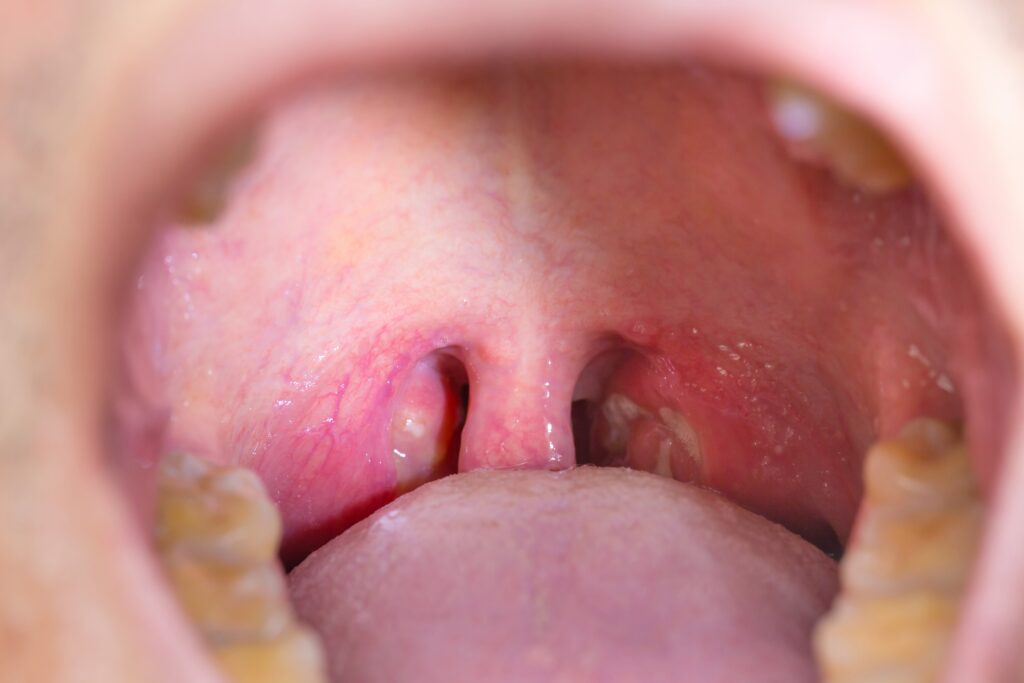
If It’s Not Hygiene, What Factors Cause Tonsil Stones?
Mainly, the cause comes down to your tonsils themselves. Specifically, the way they formed.
Some tonsils have smooth surfaces, while others are far more irregular. In the second instance, irregular tonsils will have pockets or tiny craters that trap bacteria and debris. As a result, debris gets stuck in your tonsils to harden and form tonsil stones. Sometimes a tonsil stone is also referred to as a tonsil crypt.
It’s not uncommon for smooth tonsils to get tonsil stones, but they don’t tend to be as bad and are rarely recurring.
As you can imagine, this is rather unfortunate as you have no control over the shape of your tonsils! However, suppose you keep getting tonsil stones – even after removing them – and your dental hygiene is excellent. In that case, there’s a high chance that your tonsil shape is the problem.

How to Clear Tonsil Stones?
If you suffer from tonsil stones, you should do two things: remove them and prevent them from coming back. In this section, we’ll focus on removing the tonsil stones as safely as possible and touch on who treats tonsil stones.
Gargling
Cleveland Clinic states that gargling a saltwater solution can get rid of your tonsil stones at home in many cases. However, saltwater solutions are most effective when the stones are small and have only started forming.
Keep the saltwater gargle in your mouth for as long as possible, then spit the solution back out. Check your mouth in a mirror to see if the stones have gone. Everyone should start with this method to treat tonsil stones, as it’s the easiest and least uncomfortable removal process to attempt on your own. Plus, the salt in the water can ease a sore throat and improve the PH balance in your mouth.
Physically Removing Tonsil Stones Yourself
If gargling doesn’t work, you can attempt to remove the stones using different tools.
Some people use their fingers, but this can be unclean and unsafe. Therefore, this method of removal is not recommended. Instead, you may prefer using a cotton swab, provided it is clean and unused. In addition, the soft tip can push the stones out of your tonsils, where you can spit them out of your mouth.
This technique may work for some, but it’s not ideal if you have a weak gag reflex. Instead, you could use a waterpik for tonsi stones. A water flosser is a tool you can buy online to floss between teeth. It produces a stream of water from a water tank that can eliminate food debris – think of it as a mini jet wash for your mouth!
You can spray the solution directly on the tonsil stones by angling the water flosser at your tonsils. This tool helps to dislodge them from any crevices, completely removing them!
Now, you can physically remove tonsil stones from the comfort of your home. Nevertheless, a visit to be medically reviewed by your dentist might be wise if you’ve never had tonsil stones or you can’t get tonsil stones out easily.
See a Medical Provider
The risks of hurting yourself when trying to clear tonsil stones are low when you choose the techniques listed above. Still, it’s much safer when a professional handles this for you. Your doctor can provide medical advice, diagnosis, or treatment. Most doctors will use a unique tool to poke the stones out; they may also use a water pick or water flosser.
Remember that it’s not mandatory to remove tonsil stones. If they cause you no symptoms and you can’t feel them, treating tonsil stones may not be necessary. ! They may fall out of their own accord as you eat, drink, or cough. The removal is only necessary if tonsil stones persist and cause you discomfort.
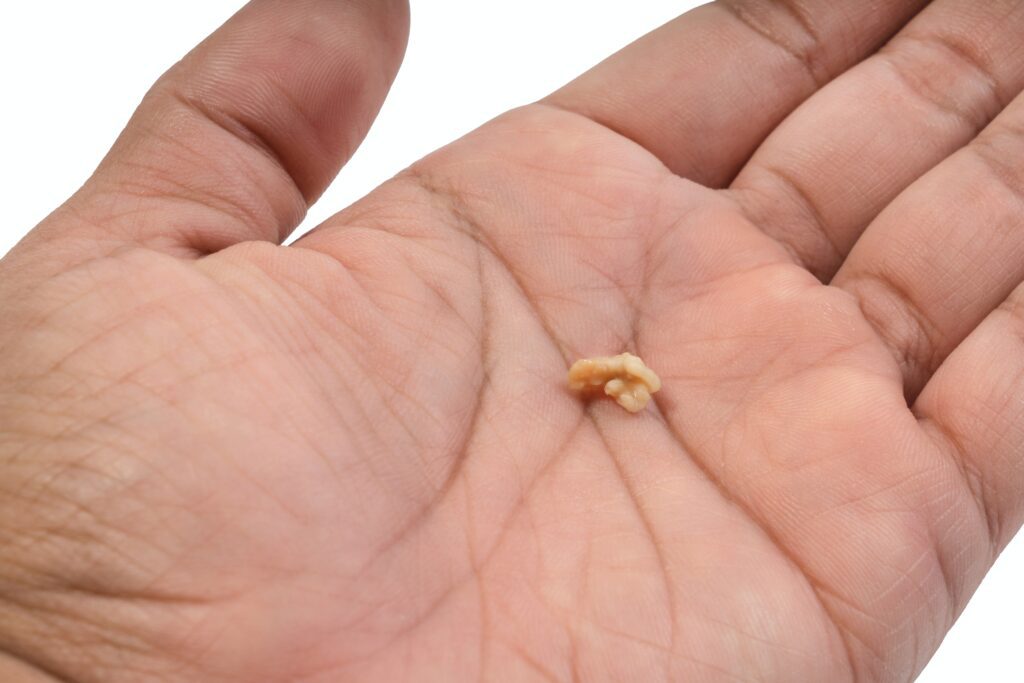
What if I Keep Getting Tonsil Stones? Are Tonsil Stones Harmful?
Some people will keep getting tonsil stones even after being removed. No saltwater gargles or other home remedies seem to prevent tonsil stones. Still, you may see improvements if you follow a set hygiene routine.
Still, chronic tonsil stone sufferers can have issues as the stones may increase the likelihood of tonsillitis or another tonsil infection. As you’re probably aware, this condition causes our tonsils to swell up, leading to an incredibly sore throat.
Tonsillitis is worse in adulthood than in children. You will most likely find it difficult to eat or drink anything. A provider can treat tonsillitis with antibiotics, but consistent tonsillitis is problematic.
Tonsillectomy
Your dentist may recommend a tonsillectomy if you keep getting tonsil stones or if there is persistent trouble when trying to dislodge tonsil stones. But, of course, this is only necessary if the stones cause recurring tonsillitis.
With this surgery, a doctor will remove your tonsils from your mouth, stopping tonsil stones from forming. It is not the ideal treatment method for this problem. Still, it may be your only option if you keep suffering from tonsillitis.
Secondly, you may have to undergo a procedure known as cryptolysis.
Laser or Coblation Cryptolysis to Treat
Different types of cryptolysis exist, but they serve the same purpose: to smooth out your tonsils.
This medically reviewed surgery will eliminate the pockets and craters in irregular tonsils, making it harder for stones to form. It’s less extreme than a tonsillectomy, but most dentists won’t recommend it unless your tonsil stones severely impact your life.
Can My Dentist Remove Tonsil Stones?
No matter what, your dental provider can help you eliminate tonsil stones. This could be through advice and methods to prevent them in the first place or by removing them using medical tools.
But, if these methods fail to work for you, a process such as cryptolysis or tonsillectomy may be necessary to stop recurring cases.
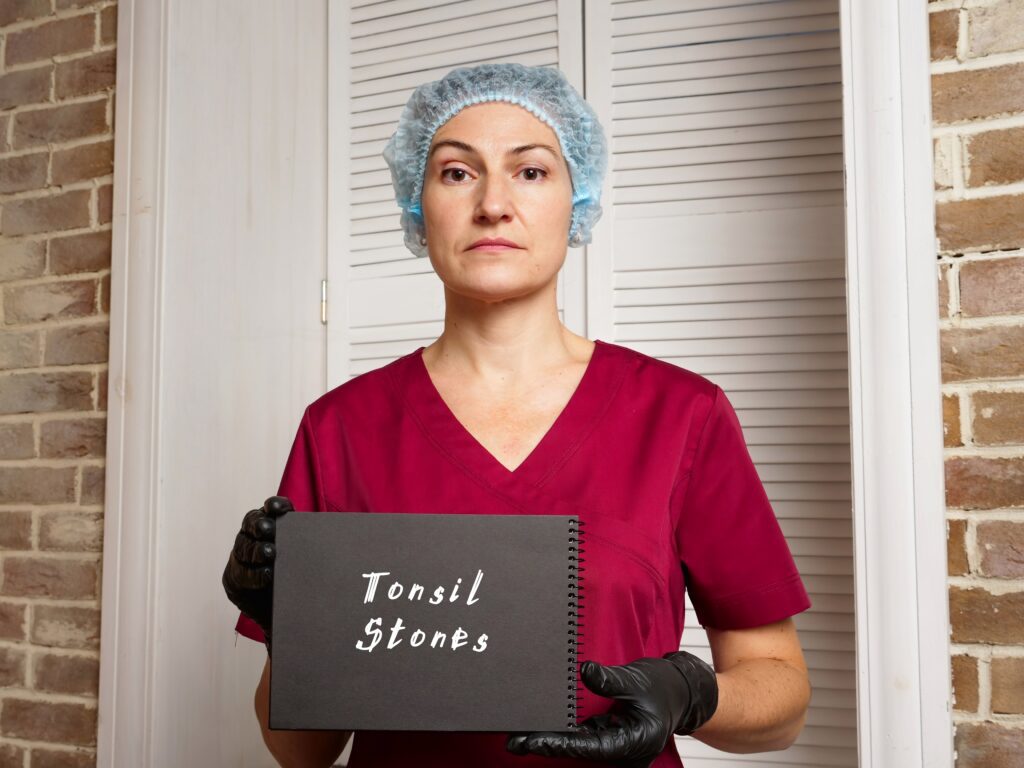
How Do I Prevent Tonsil Stones?
Refrain from assuming that surgery is your only option if you keep getting tonsil stones. Instead, you should take steps to prevent them from forming repeatedly. As you can predict, the preventative measures mainly revolve around following a good oral hygiene routine to improve oral health.
We’ve picked out four of the best tips that will help you prevent tonsil stones:
Brush Your Teeth Everyday
Brushing your teeth removes the bacteria that collects after a day of eating. It would be best if you also flossed between your teeth to eliminate any food particles lodged between them. In addition, it decreases the likelihood of debris or bacteria attaching to your tonsils.
Brush Your Tongue Everyday
Similarly, don’t forget to brush the back of your tongue! The tongue is a breeding ground for bacteria, and the close proximity to your tonsils puts them at risk.
Use Mouthwash Between Meals
Wait 30 minutes after eating and use a mouthwash solution, including gargling mouthwash or salt water in the back of the throat. You can make this yourself with salt and warm water or choose from any mouthwash products on the market.
The benefit is that your mouthwash will kill the bacteria in your mouth and help you dislodge any debris. You can also gargle with it, which removes any deposits on your tonsils. It’s an intelligent way of keeping your mouth fresh and free from bacteria throughout the day!
Drink Plenty Of Water
Water is vital for your oral health!
Keeping hydrated will help maintain a proper PH balance in your mouth while washing away bacteria and debris. It also prevents dry mouth syndrome, creating perfect conditions for bacteria to form.
Bad oral health won’t cause tonsil stones on its own. However, it is a risk factor. The only way to deal with irregular tonsils is to remove them or get them smoothed out. So, to avoid surgery, you should focus on more controllable risk factors.
These four tips form the basis of a successful oral hygiene routine, improving your oral health and lowering the risk of tonsil stones.

Conclusion
To summarize, tonsil stones are small formations caused by bacteria and debris on your tonsils. They can calcify and grow in size, causing potential complications for your tonsils. However, they are nothing to worry about in most instances as they only cause minor issues such as bad breath, a sore throat, etc.
You can remove tonsil stones at home or visit a dental provider for laser tonsil cryptolysis to treat tonsil stones. A good oral hygiene routine is essential to prevent them from re-forming, while surgery is a last resort.
If you need any advice on how to get rid of tonsil stones – or would like tonsil stone treatment – feel free to contact Patient Empowered Dentistry today. We will set you up for an appointment at our dental office to address the problem and find the best solution!
